When it comes to your audio system, your speakers, receivers, and source material are the three crucial parts. But did you know speaker wires and audio cables are just as important? If you have low-quality speaker wire and audio cables, they’re susceptible to different forms of interference and degradation, which totally ruins the vibe of your favorite tunes!
While there are many snake oil solutions regarding audio cables and speaker wires, high-quality wires and cables do make a significant difference! With high-end cables, your audio system runs at its best with sound most faithful to the source material and features the most resistance to external interferences.
So, what do these high-quality speaker wires and audio cables look like? We’ll show you!
Conductor
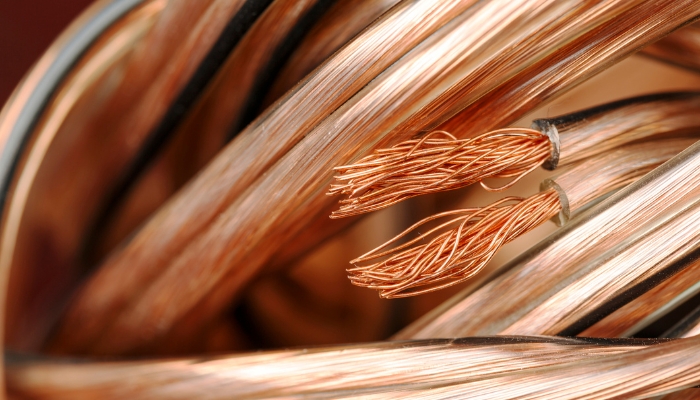
The conductor is the wire that conducts the electricity needed to pass signal and power. In high-quality audio cables, the conductor is usually made of high-purity copper or silver, which provides better conductivity than other metals. Inferior metals are more prone to resistance in the audio signal, which means not being able to listen to your music as the artists intended.
- Silver: the most conductive material, will feature brighter and more present sound, but the cost of the material makes these conductors rare.
- Copper: the second-most conductive material which features a balanced and warm sound. Copper is the more popular conductor material.
- Gold: isn’t as conductive as copper or silver and is expensive to produce, so it’s primarily used in connector platings.
- Aluminum: has exceptionally low conductive properties and lacks clarity and sound brightness.
The purity of the materials can also affect cable performance, like with oxygen-free copper (OFC), where there is minimal signal loss, distortion, corrosion, and better signal transfer.
Pro Tip: The size of the conductor is also important — if it’s too small, then it’s less likely to avoid resistance in the audio signal!
Shielding
Shielding refers to the material layer (usually foil) surrounding the cable to prevent interference and unwanted noise from other electrical devices. This outer layer can include materials such as aluminum foil, braided copper, or silver. But a high-quality shield can help reduce electromagnetic interference, radio frequency interference, and noise, which can cause signal distortion that changes the original audio of your sound.
Balanced cables don’t require much shielding since they transmit line-level audio signals that don’t require boosting and have signals that cancel out the noise. Unbalanced cables are more prone to picking up extra noise because the ground wire acts like an antenna, so these require better shielding. However, both are capable of producing faithful sound, it just depends on your speaker setup.
Pro Tip: Shielding speaker wires is a must if your wires are very long, driving powerful speakers, or if your cables are nearby several electronic devices and other cables.
Connectors
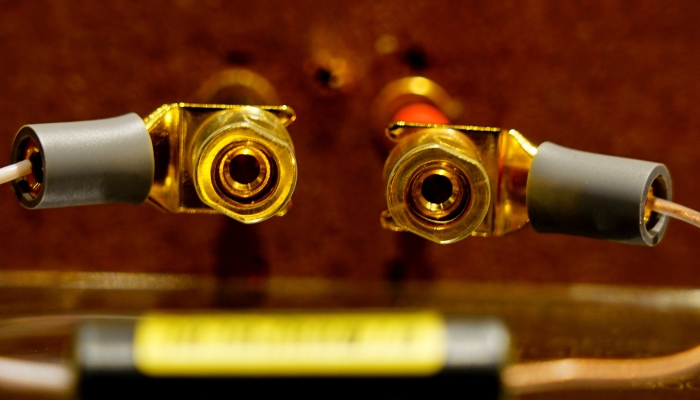
The connectors at the end of the audio cables are also crucial to ensure a reliable and high-quality connection. High-quality audio cables often feature gold or silver-plated connectors that resist corrosion, offer superior conductivity, and reduce signal loss. Other materials that resist corrosion include nickel or rhodium but remember that these do not help the conduction.
The most vital part of the connector to focus on is the solder point since it’s the only part that influences your sound — it needs a strong solder point to limit the excess noise or other undesirable influences, so you’ll always have the crispest audio.
Pro Tip: Some speaker wires come without connectors, so banana plugs are best (if you speaker has a binding post or a pin connector if you have spring clip terminals).
Cable Length & Gauge Rating
The length of your audio cables also matters since the longer length affects the electrical resistance (the opposition of the current flow). So, the longer the cables are, the more your audio is at risk of outside influences. But what also affects the length and sound is the gauge rating, which is the thickness of the wire.
The thicker the speaker wire, the lower the gauge rating, which means lower resistance and better conductivity. That means you’ll hear the clean and clear sound of The Greatest Showman original soundtrack better — ehm, we mean Led Zeppelin, of course!
Consider a wide 12- or 14-gauge wire for longer wire runs, high-power systems, and low-impedance speakers (4 to 8 ohms), and you’ll have higher power levels and better bass response. But for shorter runs less than 50 ft. to 8-ohm speakers, a 16-gauge wire is enough.
Insulation
The insulation around the conductor and shield of an audio cable is essential for protecting the cable from external factors such as moisture, temperature changes, and physical damage. And since copper is typically the main component in all wires and cables, proper insulation will prevent it from oxidizing and weakening the connection between the cable and the speaker.
So, if you keep hearing your audio crackle (and you’re not listening to vinyl) it might very likely be that your speaker wires have degraded too much from poor insulation.
Pro Tip: High-quality audio cables typically use superior insulation materials such as polyethylene, Teflon, or PVC that can help maintain signal integrity.
Interference & Resistance
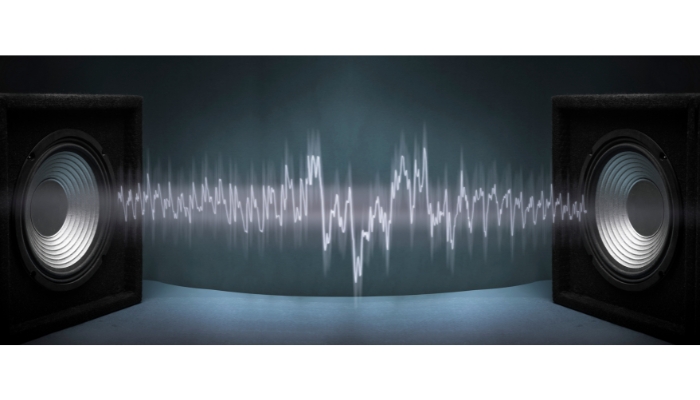
Interference and resistance can negatively impact the sound quality of your audio system, especially if you have lower-quality cables. Interference can come from various sources, including electrical appliances, radio signals, or the cables. But with a combination of high-quality shielding, superior insulation, and high-purity conductors, high-quality cables minimize all interference and leave you only the smooth sound from your favorite artists!
Resistance creates opposition to the flow of the current in the wire, which diminishes power to the speakers and creates poor sound. And several factors can affect resistance, such as cable length, thickness, and impedance. But the overall takeaway is that the lower impedance speakers you have, the more you need low-resistance wires and cables.
Pro Tip: The shorter the speaker wire, the less resistance it provides — you’ll have more clear sound!
Stranded vs. Solid Audio Cables
When you see something like stranded or solid audio cables, they’re talking about the construction of the copper conductors in the cable, which can also affect the quality of your music.
Stranded cables consist of multiple smaller strands of wire twisted together, while solid cables use a single, solid wire. While both types can provide excellent sound quality, stranded cables offer greater flexibility and are less prone to breakage from bending, which makes placing your speakers easier. Solid cables provide better conductivity leading to better signal transfer, are less likely to be affected by vibration, and hold their shape over time.
HDMI Cables and Audio Specs
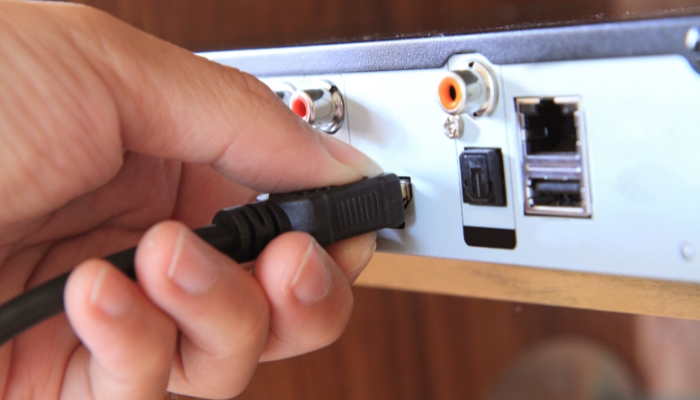
While HDMI cables are typically associated with video, they can also carry audio signals, especially when dealing with digital audio sources. HDMI cables are the only ones capable of passing Dolby Atmos and DTS HD Master audio, so if you have a high-end system, then you’ll need a high-quality HDMI cable — and trust us, you don’t want to miss out on the magical 3D soundscape that is Dolby Atmos!
That doesn’t necessarily mean buying a more expensive cable, just a better made one that can render the audio more faithfully. Bad HDMI cables struggle or fail to transmit signals over longer distances, which leads to intermittent audio signals that sounds like a CD skipping through tracks — yikes!
Sound On!
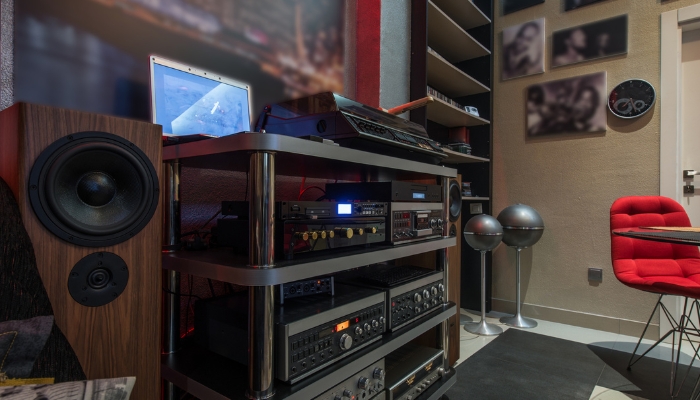
Now that you know the importance of high-quality speaker wires and audio cables, it’s time to perfect your sound system! Without the proper cables, no high-end system is complete, so don’t skip out on them. But if you don’t have stellar audio equipment yet, it’s time to start looking at Toton’s TV!
And if you have any questions, give us a call — your sound awaits!